E Lifestyles
Supporting healthy diets and active lifestyles among employees and consumers
Food and beverage (F&B) manufacturers can support their staff in eating healthy diets and pursuing active lifestyles by providing employee health and wellness programs. In addition to other benefits, these programs can help facilitate a corporate culture focused on nutrition. Supportive working practices and the provision of appropriate facilities can ensure that companies support breastfeeding mothers in giving their infants the healthiest start to life. Companies can also help consumers to adopt healthy diets and active lifestyles by supporting education programs, especially by those that target groups suffering from various forms of malnutrition. This Category E assesses the extent to which companies support such efforts.
Category E consists of three criteria:
- E1 Supporting employee health and wellness
- E2 Supporting breastfeeding mothers at work
- E3 Community-supporting healthy eating and active lifestyle programs
To perform well in this Category, a company should:
- Have programs that support employee health and wellbeing, which focus on nutrition and physical activity and are open to all employees and address workers across the food supply chain.
- Disclose quantitative and/or qualitative outcomes of independent impact analysis of its health and wellness programs.
- Have parental leave policies which respect and go beyond current regulations, including paid leave of ideally six months or more and flexible working arrangements, as well as appropriate workplace facilities for all breastfeeding mothers upon their return to work.
- Publish its policy/commitment on supporting breastfeeding mothers and a commentary about how it does so.
- A commitment to support unbranded, evidence-based, and consumer-oriented programs on nutrition literacy and education, healthy eating, and active lifestyles, developed and implemented by independent organizations with relevant expertise.
Ranking on Lifestyles
- E1
- Employee health
- E2
- Breastfeeding support
- E3
- Consumer health
- *
- Did not provide information to ATNI
Unilever ranks first, followed by Nestlé. These companies have adopted a range of policies to support employee/consumer wellness and are involving some of their partners and suppliers throughout the value chain. Since the Global Index 2018, where 22 of the current 25 companies were assessed, Ferrero and Arla have shown the largest improvement which, in large part, can be attributed to improved commitments to support breastfeeding mothers in the workplace.
Category Context
Workplace employee wellbeing includes all aspects of working life and is a key factor in determining an organization’s long-term effectiveness. Leading companies are increasingly recognizing the need to take the wellbeing of their workers seriously.
The COVID-19 pandemic has further highlighted the importance of employee wellbeing, exposing deep-routed labour market fragilities and structural inequalities. It has also profoundly impacted almost all aspects of work, including higher risks to occupational safety and health (OSH), reduction of working hours, or closure of business.
Nutrition is an important aspect of employee wellbeing and evidence shows that employers also benefit from effective workforce nutrition programs – as iron deficiency or low or high-body mass indices can lower work capacity or productivity, for example. Therefore, it is in the employer’s interest to play an important role in improving workers’ diets. Workforce nutrition programs often feature healthy food at work, nutrition education, nutrition-focused health checks, and/ or breastfeeding support. The Global Alliance for Improved Nutrition and the Consumer Goods Forum have launched a Worforce Nutrition Alliance (see Box 1) to drive positive change on this topic.
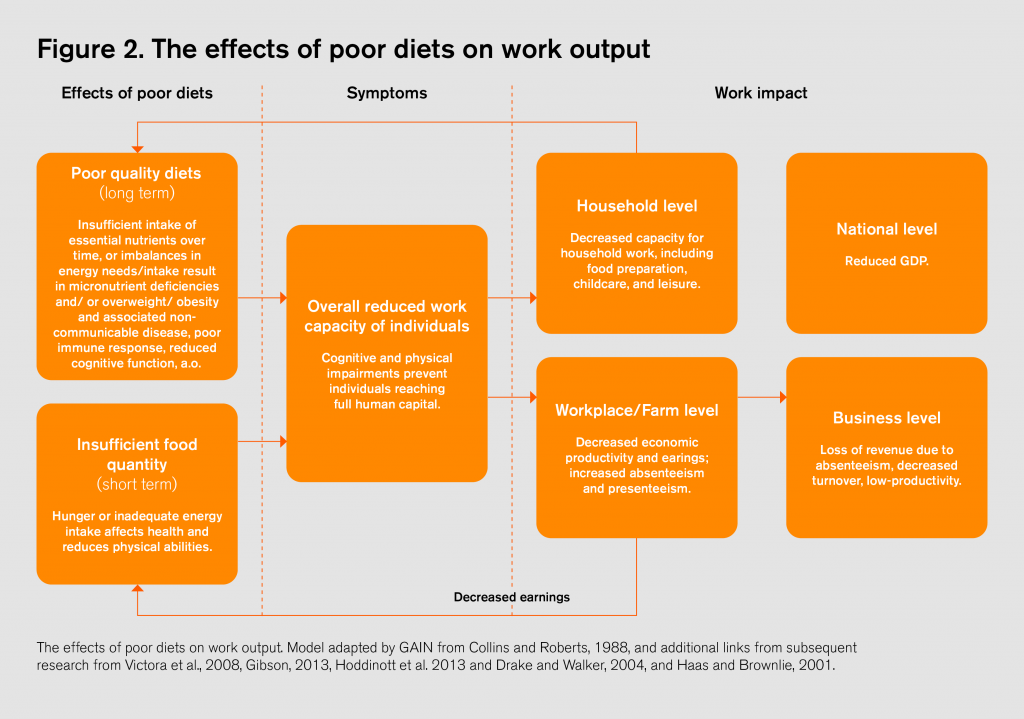
Breastfeeding is the ideal food for infants and one of the most effective ways to ensure child health and survival. Breastfeeding is also associated with health benefits for the mother. The World Health Organization (WHO) and the United Nations Children’s Fund (UNICEF) recommend that children be exclusively breastfed for the first six months of life, after which appropriate complementary foods can be introduced alongside breastfeeding for three years or more. Longer parental leave is associated with longer duration of breastfeeding. According to Article 4(1) of ILO’s Maternity Protection Convention, “a woman to whom this Convention applies shall be entitled to a period of maternity leave of not less than 14 weeks”. To optimally support mothers to breastfeed exclusively for the first six months, ATNI recommends companies to match paid leave of six months or more. Companies are encouraged to establish a policy that goes beyond legal minimums and which defines a minimum arrangement across the markets they operate in (allowing for longer paid leave where legally required). Besides parental leave, companies should also facilitate flexible working arrangements, as well as appropriate workplace facilities to ensure mothers can continue breastfeeding when they return to work.
The current COVID-19 pandemic has laid bare many questions and uncertainties from consumers around nutrition and health. Companies can have a positive impact on the health of (undernourished) consumers by supporting nutrition education, although views differ on whether and how they should be involved in programs focused on promoting healthy diets and active lifestyles. Some stakeholders believe that consumer-oriented programs should only be developed and administered by independent groups with relevant expertise and without any related commercial interests. They argue that the commercial interests of companies compromise programs, who may utilize them to promote products or distract stakeholders from the marketing of less healthy products. On the other hand, some companies argue that having company-run programs is one way to demonstrate responsible corporate citizenship and that these are, in part, a response to demands to play a more active role in promoting healthy diets and active lifestyles. ATNI’s methodology advises that companies should support or administer programs, as long as they do not serve as platforms for corporate, brand, or product advertisement.
Regarding efforts to address malnutrition in population groups for which this is a prevalent problem, limited consumer awareness around the benefits of highly nutritious foods has been a constraining factor. As such, companies can play a constructive role by supporting social marketing campaigns, which are an effective way of delivering messages about healthy foods to consumers at risk or suffering from malnutrition. Many international organizations, NGOs, governments, and others are active supporters of such campaigns.
Box 1. The Workforce Nutrition Alliance
The Workforce Nutrition Alliance was launched in October 2019 by the Global Alliance for Improved Nutrition (GAIN) and The Consumer Goods Forum (CGF). The Alliance helps employers set up effective workforce nutrition programs, by use of a framework. The framework is built on four pillars of good workforce nutrition programmes: 1) Healthy food at work; 2) Nutrition education, 3) Nutrition focused health checks and 4) Breastfeeding support.The Alliance brings together experts and thought leaders, and curates data and best practices. There are three overarching goals: 1) Advocate for the benefits of workforce nutrition programs to improve the livelihoods of millions of people worldwide; 2) Support employers to assess workforce nutrition programs, develop an enhancement plan and implement new programs; and 3) Monitor progress in creating successful workforce nutrition programs that support global nutrition goals.
Find out more at Worforce Nutrition Alliance.
Relevant changes in methodology
The underlying structure of the methodology for the Global Index 2021 has not significantly changed, but several adjustments have been made since the previous iterations to streamline it. For Category E, these include:
- The total number of indicators in Category E reduced from 34 in 2018 to 18 in 2021. In 2018, 7 of the 34 indicators in this category were non-scored, while in this iteration, all the indicators are scored.
- An indicator was added in criterion E1 to assess whether a company makes a commitment to improve the health and wellness of groups across the food supply chain (that are not direct employees) through programs focused on nutrition. In criterion E2, an indicator was introduced to assess whether a company’s provision of facilities to support breastfeeding mothers is available in all or some of its locations. And, in criterion E3, an indicator was added to assess whether a company supports or funds programs that are adapted to the specific needs, background, and nutrition literacy levels of priority populations at risk of malnutrition.
- Company actions to prevent and address undernutrition among at-risk populations in low-income countries were assessed through a specific, separate set of ‘Undernutrition’ indicators in 2018. These indicators formed 25% of the overall score companies achieved. As with the rest of the Index, in 2021, such indicators are now assessed under the overarching term of ‘priority populations’ and integrated in the chapters. As a result of this change in the methodology, the impact of such indicators on the overall score in this thematic area has increased.
More details about the changes in the methodology can be found in the methodology section of this Index.
Global Index 2021 MethodologyKey messages
- Unilever currently leads the ranking with a score of 7.6 points. It has improved its score in all the three Criterions assessed in Category E, moving up one rank in both E1 and E3.
- Ferrero and Arla showed the largest improvement, increasing their score by more than 2.5 points – which is mostly related to improved commitment and practices supporting breastfeeding mothers in the workplace. Nevertheless, Ferrero could improve by turning their commitments into a formal and comprehensive public policy for all their operations.
- Most companies (20 out of 25) make a commitment to improve the health and wellness of their employees, with programs designed to address physical health and/or nutrition.
- Aside from direct employees, only eight companies demonstrated a commitment to improving the health and wellness of groups across the wider food supply chain.
- The scope of support for breastfeeding mothers in the workplace continues to differ across countries. The majority of companies assessed do not have a global policy that is equally applied in all markets, and often commit to only follow local regulation or only provide breastfeeding facilities in their home market.
- More companies show evidence of some nutrition education and healthy diet-oriented and active lifestyle programs designed by or (co)implemented with stakeholder groups demonstrating relevant expertise. However, more should be done to ensure programs are evidence based and aligned with relevant national or international guidelines.
- The average score decreased from 3.2 in 2018 to 2.7 in 2020. Progress on developing well-designed and effective nutrition education and activity programs remains limited. Despite the need for more action to support employee health and wellbeing, especially following the COVID-19 pandemic, companies continue to show limited efforts in this area and they are strongly encouraged to increase these efforts.
General recommendations
To improve and accelerate their efforts to support healthy diets and active lifestyles among employees and consumers, food and beverage manufacturers are encouraged to:
- Increase their emphasis on improving the accessibility of their health and wellness programs, particularly on nutrition and physical activity elements, for all employees and their families globally; as well as beyond direct employees for groups across the wider food supply chain.
- Develop a global policy on support extended to breastfeeding mothers at work and support for maternal health, that applies equally in all markets – including paid leave of ideally six months or more, flexible working arrangements, and appropriate workplace facilities for all breastfeeding mothers upon their return to work.
- Particularly highlighted by increased consumer health concerns in COVID-19 times, it is crucial that companies commit to supporting unbranded, evidence-based and consumer-oriented programs on nutrition literacy and education, and healthy eating and active lifestyles, that are (co-)initiated, developed and implemented by government, knowledge institutes, or independent organizations with relevant expertise.
Noteworthy changes and best practices
-
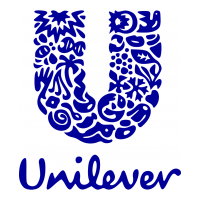
- E
Unilever’s award-winning Lamplighter Program is an innovative approach to employee wellness, using health risk appraisals alongside exercise, nutrition, and mental resilience to improve employees’ health and wellbeing. Aggregated review results show that the Lamplighter programs offer a high return on investment, indicating that good health really is good for business. Unilever states this program is key to addressing the top three health risks across their business: mental wellbeing; lifestyle factors (such as exercise, nutrition, smoking, obesity); and ergonomic factors (such as repetitive strain injury).
Unfortunately, during the COVID-19 pandemic, Unilever has had to run the Lamplighter program at reduced capacity. In 2020, 42 countries ran the Lamplighter employee health program, reaching around 32,000 employees, and the “Employee Assistance Program” also supported employees through the pandemic.
Unilever is one of eight companies that demonstrated a commitment to improving the health and wellness of groups across the wider food supply chain. These groups are not direct employees (such as smallholder farmers, factory workers, and small scale vendors). The company’s partnership in the ‘Seeds of Prosperity’, with GAIN and the Sustainable Trade Initiative (IDH), is helping tea workers and their families improve their health and wellbeing through more nutritious, diverse diets. The findings of this program will be utilized by all three groups to develop the next generation of workplace nutrition programs, with the aim of developing an approach which can be adapted to suit different businesses and contexts.
ATNI strongly encourages other food and beverage manufacturers to step up their efforts in this field.
-
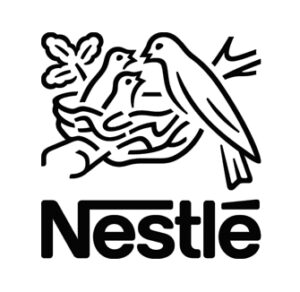
- E
In December 2019, Nestlé introduced its new “Global Parental Support Policy”. This policy promotes a gender-neutral approach, recognizing the diversity in family structures, and acknowledges that responsibilities in caring for a child are often shared by a primary and secondary caregiver. Therefore, the minimum standards set in this policy are based on caregiver status, regardless of gender, and this is considered an industry-leading practice.
The Nestlé Global Parental Support Policy specifically promotes: 1) Paid leave for primary and secondary caregivers; 2) Employment protection and non-discrimination; 3) Health protection in the workplace; 4) A conducive work environment to breastfeed; and 5) Flexible work arrangements. The policy outlines a new minimum of 18 weeks’ leave for primary caregivers, with at least four weeks for secondary caregivers. Furthermore, it requires breastfeeding rooms in all locations with at least 50 total employees, whilst previously, this was in locations with more than 50 female employees.
-
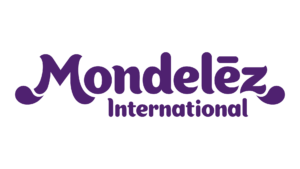
- E
In 2018, as part of a multi-year, $50 million commitment to promote healthy lifestyles and address obesity, The Mondelēz International Foundation (MIF) launched “Healthy Lifestyle Community Programs”, covering 10 countries. Mondelēz International is working with partners to address health concerns for at-risk children through a three-pronged approach: 1) offering nutrition education; 2) promoting active play; and 3) providing access to fresh foods. In India, Mexico and Australia, for example, The Mondelēz International Foundation has teamed up with Save the Children to implement such programs. In India, Save the Children and Magic Bus are jointly promoting nutrition education, active play (including sports development), and growing fresh foods for around 50,000 children and families across the country.
E1 Supporting employee health and wellness
Since 2018, corporate commitments to support employee health and wellness have increased slightly. Most companies (20 out of 25) make some commitment to improve the health and wellness of their employees with programs designed to address physical health and/or nutrition. Of these, seven make a global commitment. However, only three out of 25 companies, namely Grupo Bimbo, Nestlé and Unilever, make a public commitment to support employee health and wellness through a program focused on nutrition and physical activity, which includes meaningful expected outcomes. Meaningful expected outcomes must be quantifiable, but can be defined in various ways: e.g. by defining expected outcomes related to healthy behavior, health-related outcomes, or outcomes related to employee absenteeism.
Unilever leads the ranking on Criterion E1, with 8.5 points, followed by Nestlé. Both companies offer a comprehensive and accessible employee health and wellness program that includes nutrition components. For example, Unilever has established a “Wellbeing Framework”, which addresses physical, mental, emotional, and purposeful wellbeing. The company developed its Lamplighted employee program in 2001, which aims to improve the physical health, exercise, nutrition and mental resilience of its workforce, in all countries with 100 or more employees.
Ajinomoto and Kraft Heinz show the largest improvement compared to the 2018 Index. For both companies, several initiatives have been taken to improve the health and wellbeing of its employees at organization and interpersonal levels, and include individual elements. Ajinomoto offers the “A-Health Solution program” to support the self-care of its Ajinomoto Group employees through a focus on health status monitoring and lifestyle disease prevention. Meanwhile, Kraft Heinz launched a “LiveWell” health and wellness program in the U.S. following a successful Canadian campaign. The aim is to continue to expand this program globally through a portfolio of available benefits, such as biometric screenings, physical and step challenges, yoga classes, and nutritious/healthy eating options.
The scope of the health and wellness programs varies considerably: the programs are available to all employees at just 10 companies, while four companies also make these programs available for all family members. Only eight companies demonstrated a commitment to improving the health and wellness of groups across the wider food supply chain that are not employees (such as smallholder farmers, factory workers, and small scale vendors). An example from such a program is the Seeds of Prosperity, a Unilever partnership with GAIN and the Sustainable Trade Initiative (IDH), helping tea workers and their families improve their health and wellbeing through more nutritious, diverse diets. The findings of this program will be utilized by all three groups to develop the next generation of workplace nutrition programs, with the aim of developing an approach which can be adapted to suit different businesses and contexts.

Nine companies report that they conduct some form of evaluation of their employee wellness programs. However, only five of these – Ajinomoto, FrieslandCampina, Meiji, Nestlé and Unilever – have adopted the best practice of commissioning independent evaluations by a third-party. These are also the only five companies that publish a summary evaluation. No companies publish an independent evaluation of their wellness programs in full. Considering the importance of H&W for employee wellbeing, as well as for workers in the wider supply chain, companies can do a lot more to assess whether their programs are delivering real health outcomes.
To improve and accelerate their efforts to support healthy diets and active lifestyles among employees, food and beverage manufacturers are encouraged to:
- Increase their emphasis on improving the accessibility of their health and wellness programs, particularly on nutrition and physical activity elements that are accessible to all employees and their families globally.
- Define meaningful, quantifiable expected outcomes for their health and wellness programs, for example, by defining expected outcomes related to healthy behavior, health-related outcomes, or outcomes related to employee absenteeism.
- Make a commitment to improving the health and wellness of groups across the wider food supply chain and beyond direct employees.
- Implement robust impact assessment tools and monitoring mechanisms for employee health and wellness programs, regulated by a third-party independent evaluator.
- Improve transparency by publishing an independent evaluation of their wellness programs in full.
E2 Supporting breastfeeding mothers at work
Overall, the average score in this Criterion E2 remains approximately the same (3.0 out of 10). Since 2018, more companies (18 in total) now commit to allowing parents to take paid parental leave, and to providing breastfeeding mothers with appropriate working conditions and facilities at work. However, only five do so in a formal policy for both parental leave and appropriate working conditions and facilities for breastfeeding mothers.
Companies with a new commitment include Arla, Ferrero, Keurig Dr Pepper (first time assessed in this iteration), and Suntory. Arla and Ferrero have made the biggest improvements, and made commitments to a minimum parental leave of 14 weeks, in line with ILO recommendations. Arla has implemented the Arla Foods Parental Policy, which establishes minimum standards that must be implemented at the Arla Group workplaces across the world by the end of 2021. Ferrero could further improve by including their commitments in a comprehensive public policy for all of their operations.
Nestlé leads the E2 ranking with 9.4 points, as in the 2018 Global Index. The company introduced the “Nestlé Global Parental Support Policy” in December 2019, offering further improvements. The policy outlines a new minimum of 18 weeks’ leave for primary caregivers, regardless of gender, with at least four weeks for secondary caregivers. Furthermore, it requires breastfeeding rooms in all locations with at least 50 employees in total, while previously, this was in locations with more than 50 female employees.
Unilever (8.8 out of 10) and Danone (8.1) rank second and third respectively in supporting breastfeeding mothers at work. Both companies have strengthened their policies and public disclosure. Unilever has been increasing the availability of breastfeeding facilities and ensuring nursing mothers have two 30-minute breaks in the day. The company has also been enabling sites with over 50 female employees to provide access to crèche services that are tailored to local needs.
BRF is the only company that offers 26 weeks of paid parental leave (home market only). The company follows the local legislation regarding maternity and paternity leave in Brazil, adhering to the rules of the “Programa Empresa Cidadã”, which extends maternity and paternity leave up to 180 days (six months). Six companies offer between 14 and 26 weeks, six companies offer 14 weeks, and another five companies offer between eight and 14 weeks’ paid parental leave. Seven companies didn’t provide information, don’t have a policy on this, or have paid leave of eight weeks or less. This indicates there is much more opportunity for companies to take a leading role in extending parental leave in support of infant and parent health.

The majority of the companies assessed do not have a global policy to support breastfeeding mothers in the workplace that is equally applied in all markets, and often commit to only follow local regulation or only provide breastfeeding facilities in their home market. 15 out of 25 companies provide private, hygienic, safe rooms for expressing breastmilk. 13 out of the 25 companies assessed explicitly provide fridges for storing breastmilk, and 14 offer breaks to express breastmilk. Only four companies offer these breastfeeding facilities globally. See more details in Table 2.
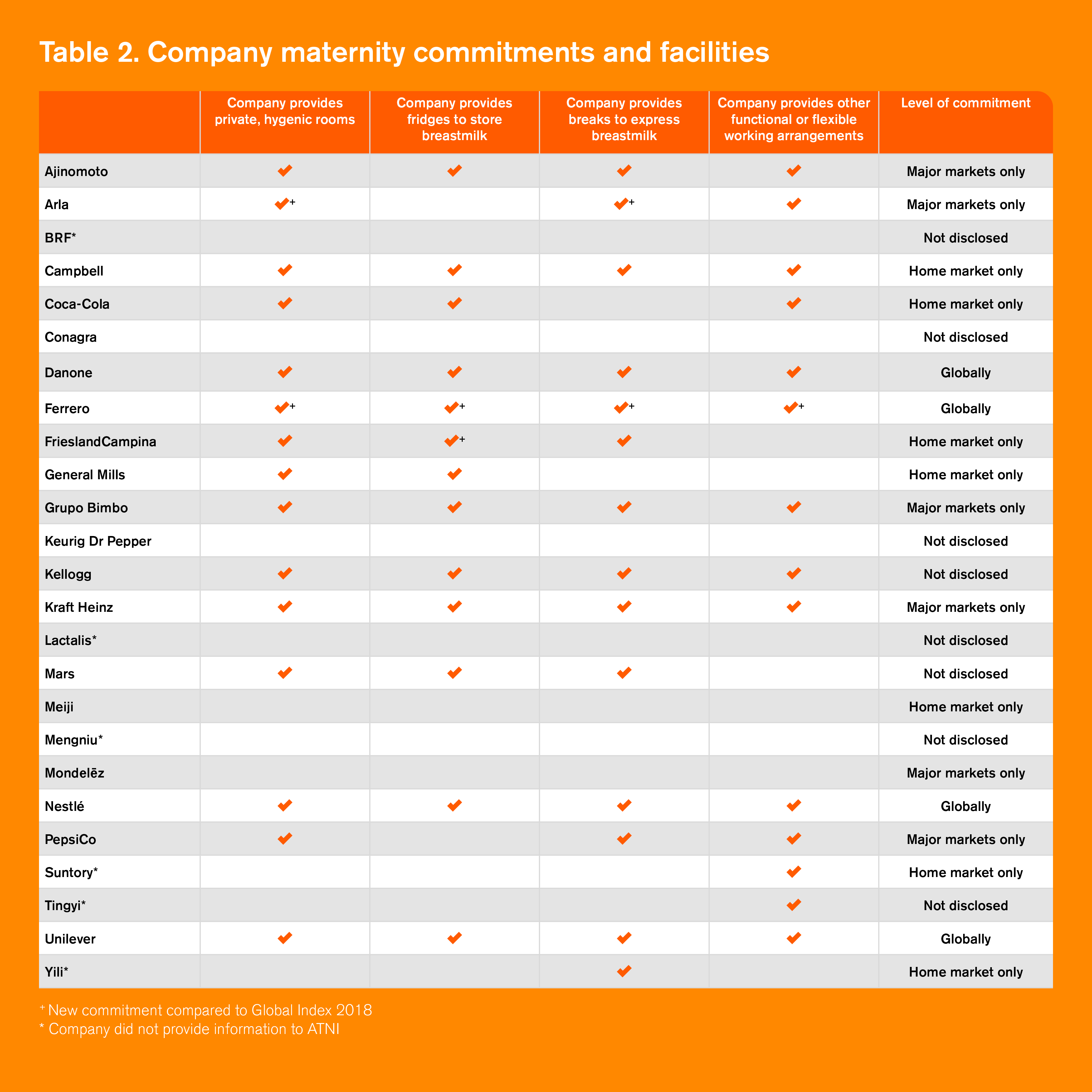
Only Danone, Nestlé and Unilever have a global policy that goes beyond local legislation and offers paid maternity leave between three and six months, as well as standard facilities in all their markets globally. Therefore, it is suggested that the other companies should enhance their support of breastfeeding mothers at work.
Only seven companies publicly report on commitments to allow parents to take paid parental leave, and to provide breastfeeding mothers with appropriate working conditions and facilities at work. Arla, Danone and Nestlé are the only companies that share a full parental policy in the public domain. Compared with the Indexes in 2016 and 2018, companies again disclose some more information in this area, although disclosure remains limited overall. For example, PepsiCo has an updated Employee Well-Being webpage which specifies the company’s facilities for nursing mothers. It states: “In a number of our locations globally, we have also worked to provide facilities for nursing mothers. In more than half of our locations worldwide with 500 or more employees, we have either dedicated mothers’ rooms, wellness rooms, or alternate space available for nursing mothers. We are actively working to expand the number of PepsiCo locations with facilities for nursing mothers in the coming years.”
To improve and accelerate their efforts to support breastfeeding mothers at work, food and beverage manufacturers are encouraged to:
- Develop a global policy on support extended to breastfeeding mothers at work and support to maternal health, that applies equally in all markets.
- Increase transparency about the support extended to breastfeeding mothers at work and support to maternal health, by making the policy publicly available.
- Extend parental leave policies to go beyond current national regulations, including paid leave of ideally six months or more.
- Expand currently limited arrangements to support breastfeeding mothers to: 1) provide private, hygienic, safe rooms for expressing breastmilk; 2) allow breastfeeding mothers breaks to express breastmilk; and 3) offer flexible working arrangements to support breastfeeding mothers.
- Expand commitment to support breastfeeding mothers to all locations with over 50 employees, regardless of gender.
E3 Community-supporting healthy eating and active lifestyle programs
Like in the previous Global Index, Mondelēz is the company with the most extensive consumer lifestyle programs. FrieslandCampina and Unilever follow, having both improved their scores significantly compared to 2018. These companies show leading practices in different areas: For example, by funding programs that are evidence-based and (co)implemented with stakeholder groups with relevant expertise, excluding product branding and adapted to the needs of specific groups.
Only 11 out of the 25 companies assessed commit to, or demonstrate, that some of their healthy eating and active lifestyle programs exclude product or brand-level branding. FrieslandCampina is the only company that demonstrates that all programs exclude product or brand-level branding. On their website, it is stated: “…there are no product names mentioned and there are no visuals of FrieslandCampina products on our communication and educational tools”. The company offers a variety of examples of supporting educational programs about healthy nutrition, such as the “Drink. Move. BeStrong campaign”, which assisted parents and teachers in creating awareness among children of the need to exercise sufficiently indoors and outdoors, eat responsibly, and live a healthy life.
Only two companies – Mondelēz and Danone – commit to, or demonstrate, that all of their programs are evidence-based and aligned with relevant national or international guidelines. Another 12 companies commit to, or demonstrate, that some of their programs are evidence-based and aligned with relevant national or international guidelines. The Mondelēz International Foundation, the company’s philanthropic arm, funds community programs offering nutrition education, promoting active play, and providing access to fresh foods. All of their community programs are based on a Private-Public Partnership model that is endorsed by the National Academy of Medicine (NAM – formerly known as the Institute of Medicine, United States), the WHO and the World Bank.
In total, 20 companies show evidence of some programs funded, designed by or (co)implemented with stakeholder groups with relevant expertise, a considerable improvement compared to the previous iteration. This implies that companies have stepped up their efforts in supporting consumer-oriented information and programs for better nutrition and healthy lifestyles. Of these 20 companies, 14 also aim to adapt to specific needs, background, and nutrition literacy levels of specific groups at risk of micronutrient deficiencies. There are five companies – ConAgra, FrieslandCampina, General Mills, Mondelēz and Unilever, that only fund programs which are designed by and/or (co)implemented with diverse stakeholder groups with relevant expertise. Unilever, for example, has a variety of consumer-oriented health/nutrition education programs in both low income and low-and-middle income settings. For their Green Food Steps programme in Nigeria, Lutong Nanay in the Philippines and Nutri Menu programme in Indonesia, Unilever is working with local partners to help consumers eat healthier.
14 companies have a description of their nutrition education/nutrition literacy and healthy diet-oriented/active lifestyle programs on their website. Five companies disclose that that their programs are required to be evidence-based and aligned with relevant national or international guidelines. Only three companies have a document that sets out their policy on brand-level branding: FrieslandCampina, Mars and Mondelēz.
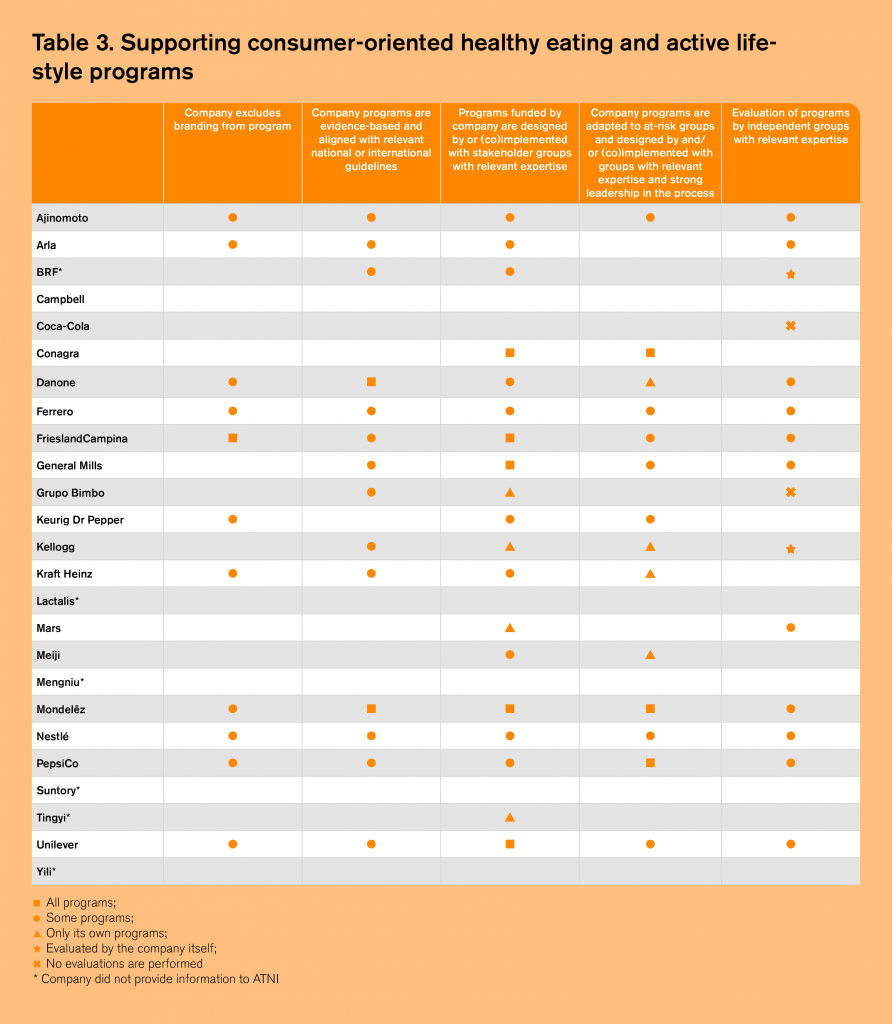
To improve and accelerate their efforts to support healthy diets and active lifestyles among consumers, food and beverage manufacturers are encouraged to:
- Develop a policy that excludes brand-level sponsorship of consumer orientated programs and/ or increase transparency to show how the company ensures consumers will receive independent, evidence-based information.
- Ensure consumer-oriented healthy eating and active lifestyle programs are evidence based and aligned with relevant national or international guidelines.
- Support programs that are developed and (co-)implemented by independent third-parties with relevant expertise, such as governments and knowledge institutes.
- Commission independent evaluations of these programs and publicly disclose the results.
- Further expand the positive impact they can have on the health of (undernourished) consumers by supporting programs that are adapted to the specific needs, background and nutrition literacy levels of groups at risk of micronutrient deficiencies.

